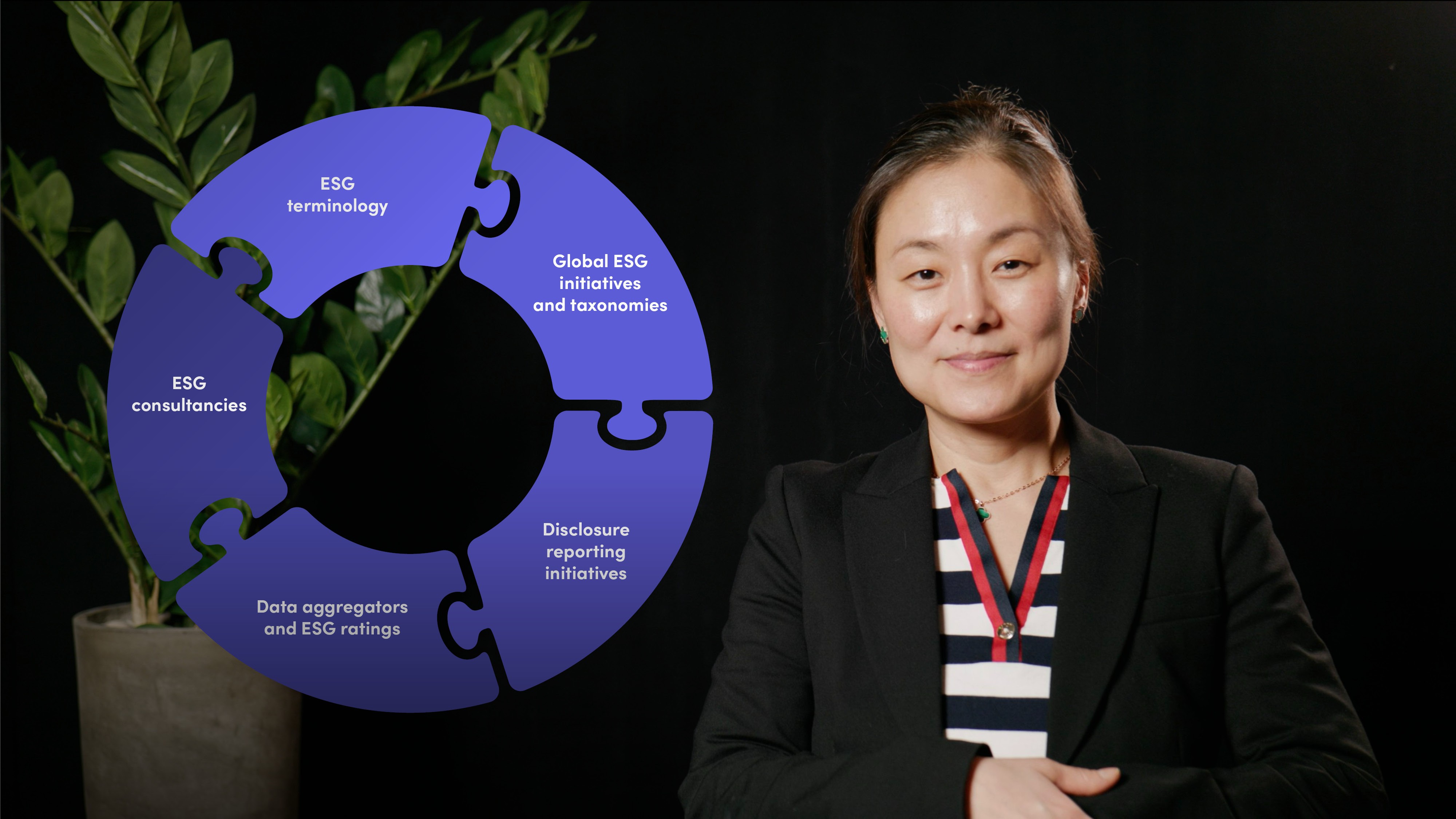
Sustainability Jargon Buster I

Simone Koo Ishikawa
20 years: Investment Banking
Discover the significance of ESG factors in business decision-making, as Simone explores key ESG terminology, global initiatives, disclosure reporting, data aggregators, ESG ratings and consultancies in this and the following video. Gain valuable insights to lead a sustainable business effectively.
Discover the significance of ESG factors in business decision-making, as Simone explores key ESG terminology, global initiatives, disclosure reporting, data aggregators, ESG ratings and consultancies in this and the following video. Gain valuable insights to lead a sustainable business effectively.

Sustainability Jargon Buster I
10 mins 26 secs
Key learning objectives:
Understand the key ESG concepts used in sustainable business practices
Understand how ESG terminology is essential to evaluate a company's sustainability practices
Understand how global ESG initiatives and taxonomies is essential to lead a sustainable business
Overview:
In recent years, there has been a growing awareness of the importance of ESG factors in business decision-making. ESG encompasses environmental impact, social responsibility, and corporate governance. Understanding key ESG terminology helps evaluate a company's sustainability practices and ethical conduct. Global ESG initiatives and taxonomies provide targets and categorize projects for businesses to take action. Disclosure reporting initiatives promote transparency in ESG reporting, enabling informed decisions. Data aggregators and ESG ratings evaluate companies' ESG performance. ESG consultancies offer expert advice and support in developing effective ESG strategies.
How can senior management effectively communicate the nuances of sustainable investing terminology to stakeholders?
Senior management can effectively communicate the nuances of sustainable investing terminology to stakeholders by providing clear definitions and explanations of terms like ESG, sustainability, impact investing, and greenwashing. They can educate stakeholders through presentations, reports, and other communication channels, ensuring that the information is easily understandable and accessible. Senior management should also highlight the specific actions and initiatives taken by their organisation in relation to ESG factors, sustainability goals, and impact investing, providing tangible examples to demonstrate their commitment.
How can companies ensure that their sustainability efforts go beyond ESG factors and have a meaningful impact on society and the environment?
To ensure that their sustainability efforts go beyond ESG factors and have a meaningful impact, companies should adopt an integrated approach that considers the broader social and environmental context. They can start by setting clear and measurable sustainability goals that align with global frameworks such as the United Nations Sustainable Development Goals (SDGs). Companies should identify the most material issues and prioritise their efforts accordingly, focusing on areas where they can make the most significant positive impact. Collaboration with stakeholders, including customers, employees, local communities, and NGOs, can help ensure that sustainability initiatives address relevant challenges and have a wider reach. Regular monitoring, measurement, and reporting of progress are crucial to track the effectiveness of sustainability efforts and make necessary adjustments. Companies should also consider seeking external verification or certification of their sustainability practices to enhance credibility and transparency. By taking a holistic and proactive approach, companies can create meaningful change and contribute to a more sustainable future.
How can we promote global consistency in sustainable business practices despite the lack of standardised ESG regulations?
While global consistency in sustainable business practices is challenging without standardised ESG regulations, there are several actions that can be taken. First, international collaboration and knowledge-sharing among governments, regulatory bodies, and industry associations can help establish common principles and best practices. Forums and conferences focused on sustainability can facilitate dialogue and the exchange of ideas. Second, voluntary initiatives and frameworks, such as the United Nations Global Compact and the Task Force on Climate-related Financial Disclosures (TCFD), can provide guidance and encourage companies to adopt consistent ESG practices. Third, investor pressure and market forces can play a role in driving consistency. Investors increasingly consider ESG factors in their investment decisions, and demanding transparency and accountability from companies can push for greater consistency in reporting and performance. Lastly, engagement with stakeholders, including civil society organisations, communities, and consumers, can influence companies to adopt sustainable practices and align their operations with societal expectations.
What are the benefits of implementing taxonomies for sustainable finance and how are different jurisdictions approaching their development?
Implementing taxonomies for sustainable finance offers several benefits. It provides clarity and standardisation by defining what constitutes environmentally sustainable economic activities, helping investors identify sustainable investments and avoid greenwashing. Taxonomies also enable governments to direct financial resources towards climate-friendly projects and initiatives, accelerating the transition to a low-carbon and sustainable economy. Additionally, they facilitate the growth of sustainable finance markets by creating a common language and framework for investors and issuers.
Different jurisdictions are approaching the development of taxonomies in various ways.
- The European Union (EU) has taken a leading role by developing a comprehensive sustainable finance taxonomy that sets out criteria for environmentally sustainable activities.
- The UK is working on establishing its own taxonomy, building upon the EU's framework but tailoring it to fit its specific economy.
- The United States is yet to develop a federal-level sustainable finance taxonomy, but the Securities and Exchange Commission (SEC) is proposing climate-related disclosure requirements for registered firms.
- China has developed multiple taxonomies, including the Green Bond Endorsed Project Catalogue, to promote green projects and investment in environmentally sustainable initiatives.
Overall, these efforts reflect the increasing recognition of the importance of taxonomies in driving sustainable finance and guiding investment decisions towards a more sustainable future.

Simone Koo Ishikawa
There are no available Videos from "Simone Koo Ishikawa"

